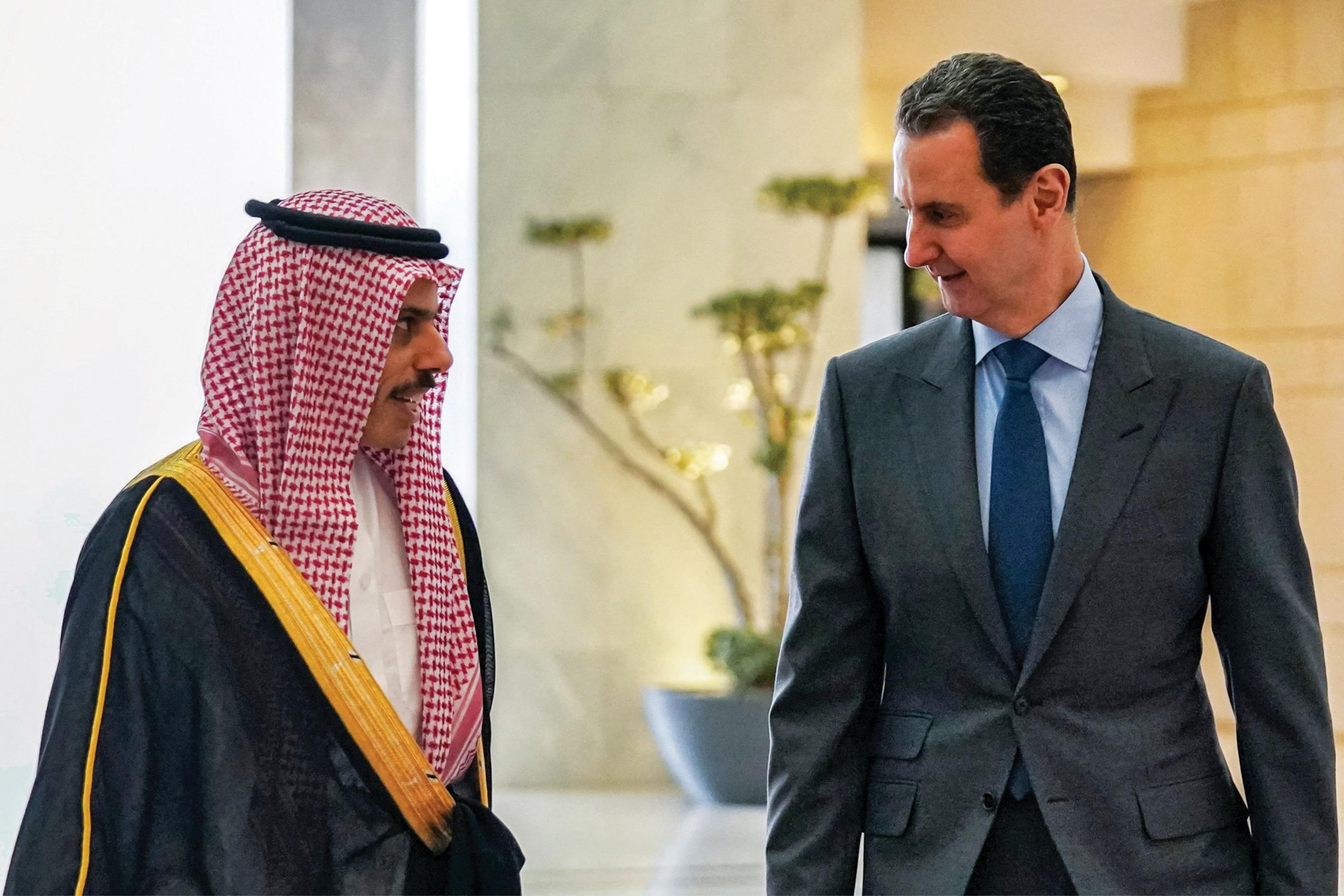End to Damascus’ 12-year isolation may facilitate peace, growth: Experts
 Syria’s President Bashar al-Assad (right) receives Saudi Arabia’s Foreign Minister Prince Faisal bin Farhan Al Saud, in Damascus, on April 18. (PHOTO / AFP)
Syria’s President Bashar al-Assad (right) receives Saudi Arabia’s Foreign Minister Prince Faisal bin Farhan Al Saud, in Damascus, on April 18. (PHOTO / AFP)
Saudi Arabia and Tunisia have joined moves among Middle Eastern nations to mend relations with Syria, calling for Damascus to be allowed back into the Arab League after 12 years of isolation.
Experts suggested that further resumption of Middle East relations will provide a necessary path to creating sustainable economic ties and broader diversification efforts in the war-fatigued region.
Syria was part of the 22-member League of Arab States from its founding in 1945 but was suspended in 2011, following demonstrations. However, in recent years several Arab states, such as the United Arab Emirates, have begun to normalize ties with Damascus.
On April 18, Syrian President Bashar al-Assad welcomed visiting Saudi Foreign Minister Prince Faisal bin Farhan Al Saud in Damascus —the first trip of a senior Saudi official since the outbreak of the Syrian war. Assad told Prince Faisal that the reconciliation between Syria and Saudi Arabia will have positive effects, not only on both countries but also on the wider Arab region, Xinhua News Agency reported.
Prince Faisal reiterated Saudi Arabia’s support for Syria’s territorial integrity, security, and stability, as well as facilitating the return of Syrian refugees. He also emphasized the need for normalizing relations between Syria and all Arab countries, to restore Syria’s role in the Arab world and the wider region.
Prince Faisal’s visit to Damascus came just days after Syrian Foreign Minister Faisal Mekdad visited Saudi Arabia.
Tunisia, in the process of mending ties with Syria, affirmed its support for the isolated country’s membership to the Arab League to be restored.
The Tunisian foreign ministry stressed that Syria’s security and stability is a pillar of that of the entire region, Xinhua reported, citing a statement posted on the ministry’s official Facebook page.
Damascus and Tunis are moving to resume diplomatic relations after Tunisian President Kais Saied met visiting Syrian Foreign Minister Faisal Mekdad on April 18.
“During the meeting, Saied affirmed Tunisia’s firm keenness to resume the strong and historical ties of brotherhood and cooperation between Tunisia and Syria,” read a statement from the Tunisian presidency.
Arhama Siddiqa, a Middle East analyst and research fellow at the Institute of Strategic Studies Islamabad in Pakistan, told China Daily that against the backdrop of the global fiscal crunch, all countries, including those in the Middle East have been trying to create sustainable economic ties.
For the Gulf States, primarily Saudi Arabia, “this includes finding avenues which will help them stave off oil dependency”, she said.
Rasha Al Joundy, a senior researcher at the Dubai Public Policy Research Centre in the United Arab Emirates, noted that the regional and international situation has changed and that it is “what pushed for a possible comeback for Bashar al-Assad to the Arab League”.
“Of course, all this discourse was possible after the deal between Saudi Arabia and Iran in China, which eased the way for a reconciliation between Saudi Arabia and Syria, after it also affected the political process in Yemen,” Al Joundy told China Daily.
Internationally, she said, the Ukraine conflict “is a priority, especially for the US which stopped waiving sanctions if any country restored relations with Assad”, which could mean the sanctions could be less observed in the coming years.
However, on April 13, Qatari Prime Minister Sheikh Mohammed bin Abdulrahman bin Jassim Al Thani said in a televised speech that there were reasons for Syria’s suspension from the Arab League, and “these reasons still exist”.
It is anticipated that Syria’s return to the Arab League will be tackled at the 32nd Arab Summit, which is expected to be held in Saudi Arabia on May 19.
“It should not be forgotten that Syria represents a passage to the Mediterranean,” said Siddiqa, which is a recourse to the Suez Canal. Syria is also advantageously located at the junction of oil and gas pipelines at the crossroads of Africa, Europe, the Caucasus, and Central Asia.
On April 12, Riyadh-based Al Arabiya English reported, quoting a US National Security Council official, that the US had stressed to Arab countries renewing ties with Syria that credible steps to improve Syrians’ humanitarian and security situation “should be front and center in any engagement”.
Siddiqa said that despite the significant presence of the US in the region, the Arab states will look at what most benefits them in the region, and that is economy, peace and security.
“If bringing Assad back into the fold gives all that to them, then they do not care about defying the US,” said Siddiqa.
That may benefit the US in the long run, she added. “The US created a lot of mess in the Middle East,” she said.


